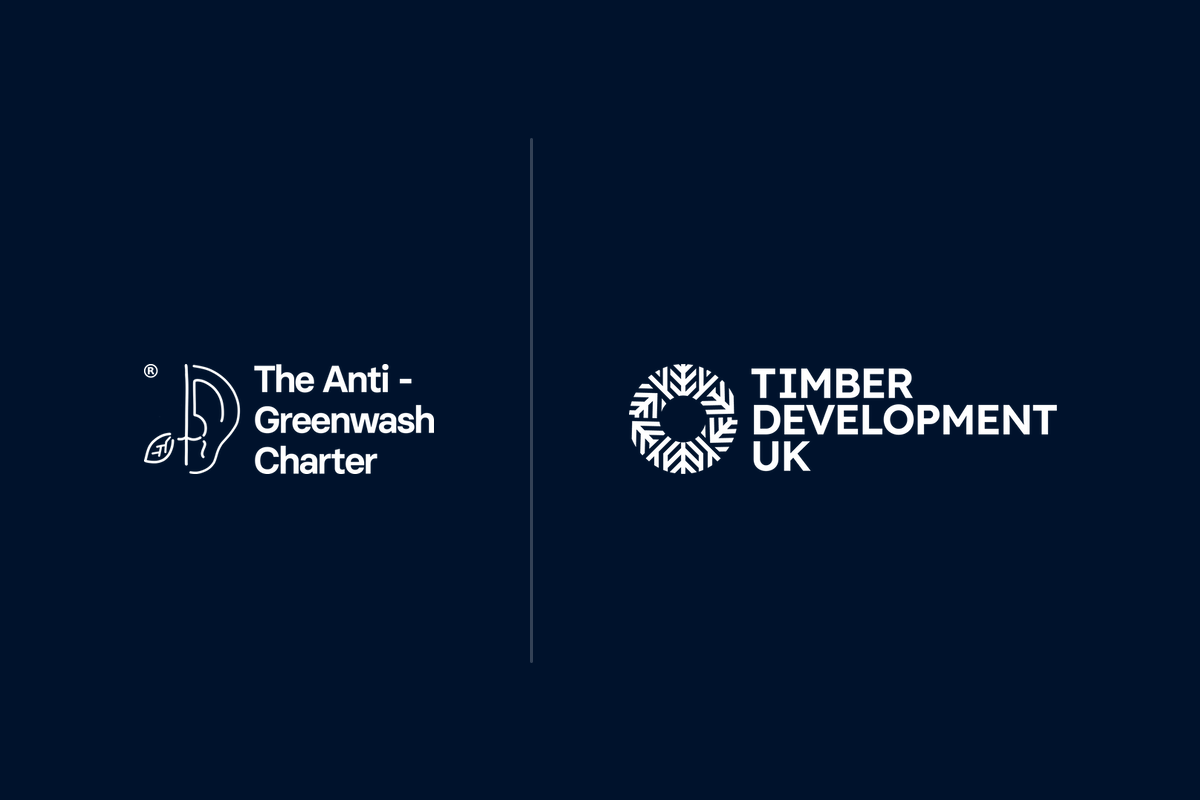
Charlie Law of Timber Development UK (TDUK) explains why the organisation joined the Anti-Greenwash Charter.
Date: Nov 2023
Read time: 4 mins
Author: Charlotte Waters

Industry body TDUK aims to connect the timber supply chain “from sawmill to specifier, and all points in between”. Its other mission aims are to lead best practice, and accelerate a low-carbon future. We asked their Sustainability Director, Charlie Law, to explain more about that, and why joining the Anti-Greenwash Charter seemed like part of the solution.
Construction and climate change
The Government has set the UK ambitious net-zero targets. Nonprofit Architecture 2030 estimates that 42% of CO2 emissions globally come from construction and building operations, so the construction sector is under pressure to show it builds responsibly and creates efficient, low carbon structures.
This creates both opportunity and hazard. Sustainable approaches to construction should grow given these priorities. However, ill-thought-out communications can make even honest organisations look untrustworthy, especially since increases in scrutiny and precisely-defined regulation mean weak claims will be increasingly highlighted.
Timber has genuine sustainability advantages over traditional building materials (it stores carbon and is renewable, provided you plant to replace what you harvest). Messaging will backfire, however, if claims are not made honestly and carefully.
We became signatories of The Anti-Greenwash Charter to help shape guidance to our members in this area, and to formalise our own policies, so we could demonstrate best practice ourselves.
The importance of defining your terms
The heart of honest messaging is to define the terms you use, so that you and others have a basis for assessing whether they are true. The Anti-Greenwash Charter works with members to create a green claims policy that is consistent with wider standards, but also customised and useful for the new member and their stakeholders.
With their support, we created our own TDUK Green Claims Policy which has sections on our standards and practices, and the values we expect of members. The longest section, though, is a set of sustainability-related terms, each carefully defined. By committing to being a signatory, we have pledged to use language in accordance with these definitions, and are urging our members to do so too.
This glossary is a work in progress, incidentally. We may respond to government definitions, and have noted some areas that merit further investigation. In a changing world, refinement of these definitions may never come to a final close.
Pretending you’re perfect means you stop improving
Whatever materials and methods you use, erecting a building means preparing and transporting various products and then working with them over a programme. The embodied carbon within these products is attracting more attention as operational carbon emissions over the life of an asset are reduced.
We have seen that some construction products, and indeed projects, claim negative numbers for embodied carbon impact, suggesting that if only the governments of the world rushed to build more such structures, climate change would be reversed. Sadly, that would not work, as the production and delivery of all materials, including timber, have a carbon impact, however small.
The key reason for these negative figures is the inclusion of sequestered biogenic carbon (i.e. the CO2 the tree has pulled out of the atmosphere during its growing cycle and locked away within the timber) in assessments, without acknowledging that this will be transferred at end-of-life to another product or to atmosphere. Older assessment standards did not require the whole lifecycle of the product to be considered. Likewise, some construction project assessments also only considered the Upfront Carbon impact.
However, it is now acknowledged that including sequestered biogenic carbon, without considering the end-of-life scenarios, is misleading. Therefore, the latest versions of standards such as EN 15804 and EN 15978 now require a Whole Life Carbon Assessment (WLCA) to be carried out. This requirement has also been included in the latest RICS Professional Standard on WLCA, however it does also acknowledge that Upfront Assessments are regularly carried out, in which case any biogenic carbon must be excluded from the assessment and stated separately to show the Stored Carbon benefit of the biobased elements. However, it also acknowledges that dynamic assessment (taking into account possible alternative end-of-life scenarios) may deliver alternative results that show an improved carbon balance due to the biogenic carbon content.
We therefore encourage all TDUK members to refrain from claiming their products or construction projects are Carbon Negative, Carbon Neutral, or Climate Positive (unless of course they can demonstrate this over the whole life of their product or project), and instead focus on the benefits of the product having a far lower carbon impact than like-for-like products in like-for-like applications and stored biogenic carbon overall.
We are leading by example here at Timber Development UK and urge all members who create case studies to maintain a careful separation of these figures. Our products generally have a much lower embodied carbon impact than other mainstream construction materials, without us having to resort to misleading claims.
Green claims should be made proudly where they are true and meaningful. Otherwise, we should refrain from making them.
If you think the Anti-Greenwash Charter embodies the values of your organisation, find out more here.